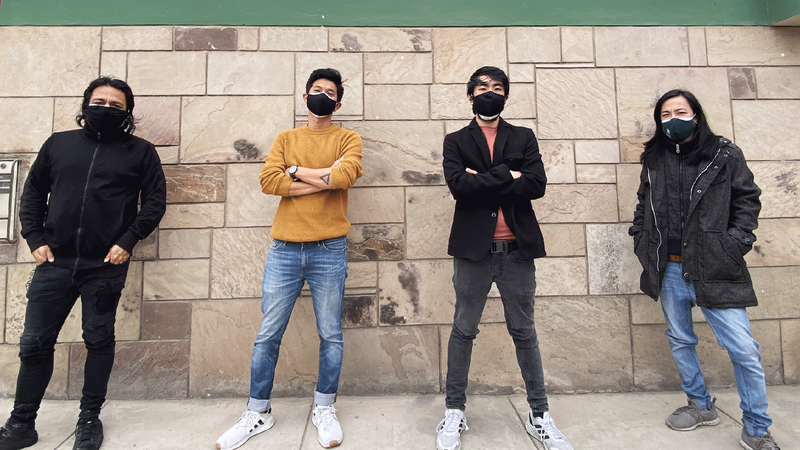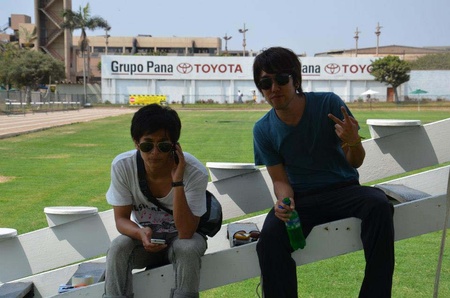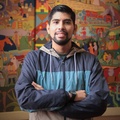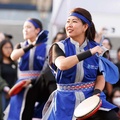Many entrepreneurship stories begin like this: a group of friends gets together to start a project taking advantage of the trust and chemistry that exists between them. Many of these garage dreams prosper and end up becoming big brands that allow their founders to dream bigger. Some, like the advertising agency Pasaporte Studio, are making their dream a challenge against all reality.
The story of the agency began five years ago, but that of Kiyoshi Salazar Nakama and Takeshi Asato began a long time ago, when they met in the AELU Minors Movement, where they became friends. Both had similar careers, design and advertising, and went through the main advertising agencies in the country: Mayo, Circus Grey, Wunderman Thompson.
They were doing very well, they managed large accounts, with the accelerated pace of large, demanding and absorbing companies. And before the Covid-19 pandemic emerged, they decided to put their world on pause by starting their own project: an agency that would be guided by the creative perspective and the Nikkei values with which they had been trained. And to start this trip they took a tour of Southeast Asia.
First stop: inspiration
“When I left school, I thought about studying hospitality and tourism,” says Kiyoshi, “but I left it and started working in a sushi bar.” Takeshi was his ' senpai ', as he inspired him to study graphic design and then, destiny and love took him to Buenos Aires, where he continued with advertising and art direction. After a few years of intense work, they decided to create Pasaporte Studio, to “do things differently, with people's satisfaction as a priority.” And they looked to Southeast Asia for inspiration.
“We had to do a detox of advertising, make a clean slate. We went for two months to several countries, Japan, Thailand, Vietnam, Malaysia. The strange thing is that there, with a single document, which is the passport, you can visit more places, it is a great tool for exploring,” says Kiyoshi, who remembers that they spent all the savings they had, so when they returned to Lima they started again. zero: no clients or budget.
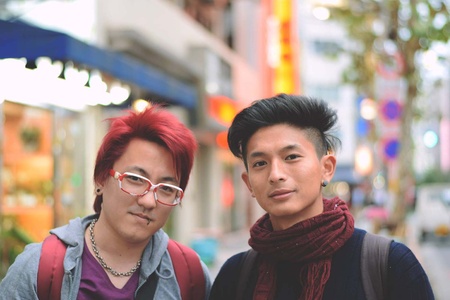
“Starting a business is difficult in Peru, we had no administrative knowledge, it was a challenge and the most difficult thing was to get out of the circle of the large advertising agencies without knowing who might want our services,” says Kiyoshi. “The first day we started in the living room of my apartment and began putting together a communication proposal to COPANI (Pan American Nikkei Convention) and APJ (Peruvian Japanese Association). The idea was to move.”
Second stop: investment
Their first formal client was a brand of natural sugar-free juices: ZUMA Cold Pressed. They took care of their stores, social networks and advertising campaigns. With the profit from their first client, they invested to rent an office and soon new accounts began to enter to which they offered a comprehensive service: restaurants, apps, drinks, educational centers, automotive, financial. Their work can be seen on their dynamic website .
In 2019 it opened operations in Sydney, Australia, working with Healthy Llama, a Peruvian superfoods brand, but 2020 is its big year of takeoff. Growth excites them and leads them to look for new members for the team. Shinryo Okuhama, an old friend of the AELU Minors Movement and collaborator of Pasaporte Studio, would end up dedicating himself to administrative management and taking the agency in new directions.
“Shin became our partner. The first year there were two of us in the agency and in a single year we went from fourteen to almost 45 people,” says Kiyoshi Salazar. It was a growth that took them by surprise and in the midst of a pandemic. They needed a technical scale. “Working remotely caught us all cold, us and the clients… many began to invest in digital communication and at the agency we needed to organize ourselves to serve them.”
Third stop: satisfaction
Shinryo is managing director of Passport Studio, but he studied advertising and has the sensitivity of an experienced psychologist. Perhaps because of his training in ontological and creativity coaching. At the age of seventeen he met those who are now his partners, with whom he played soccer, and followed a path similar to theirs: work in large advertising agencies and a greater desire to make work a place where he could realize his dreams without lose sleep
“I became interested in acquiring Passport shares and we realized that we needed someone to help put things in order… there was plenty of advertising talent,” says Shin. The compatibility and trust that existed between them is something that he attributes to both their training and the experience they have had with the AELU Youth Movement. “We are trained to be agents of change,” says Shin, trying to maintain humility in each sentence.
One goal is to have a positive effect on the Passport team. “With the pandemic, communication and closeness were lost a little,” he explains, “our philosophy is focused on the team, we want people to feel good here.” To do this, they have used satisfaction surveys, focus groups and evaluations of the work environment to provide them with benefits and adequate spaces for integration. But perhaps the most revolutionary thing has been the simplest. “We listen to everyone and we are always open to change, to do what they suggest.”
Fourth stop: challenges
Achieving a balance in schedules, listening to the team and being transparent are the key steps of an agency that challenges work standards to achieve what everyone would like: a place where you can always be better. The pandemic opened an opportunity in terms of location: part of the team is in other countries (Argentina, Spain, the United States), but with organization that has not become a difficulty.
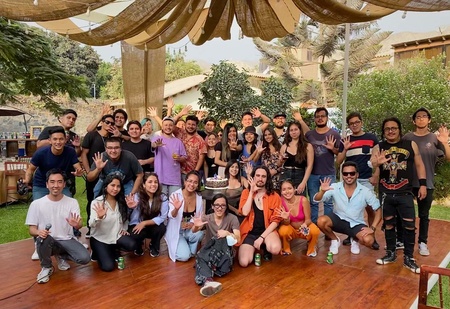
“The important thing is not to lose the connection that you regained by working from home with your family and maintaining the home office,” says Kiyoshi, who is grateful for having gone through customer service when he was in a sushibar because it has helped him manage business relationships. from an agency that continues to grow in Mexico and Spain. “We are a service company, if the talent is bad, what service can you provide?” he says with a logic that has no flaws but that few companies usually outline.
“You produce more if you enjoy more,” says Shinryo Okuhama in what seems like an advertising slogan, but in Passport it is supported by the Kaizen philosophy. “You can't expect a big change overnight, everything is done little by little,” he adds, without failing to mention that his creativity studies have helped him communicate better. The search for values for his team has also helped him rediscover his Nikkei identity.
He also remembers that it was Kiyoshi and Takeshi who got him more involved in the Nikkei community with which he had little contact until he arrived at AELU. As if they were still kids leading other kids in a social-spirited sports club, their agency works like a team in which every challenge is faced with imagination. “This year we are working on the internal brand, redefining our purpose, working on a more strengthened internal operation, without so much turnover in the team,” says Kiyoshi with the contagious emotion that they have not lost from when they were enthusiastic teenagers. From his looks and his dreams they still seem that way.
© 2022 Javier García Wong-Kit


